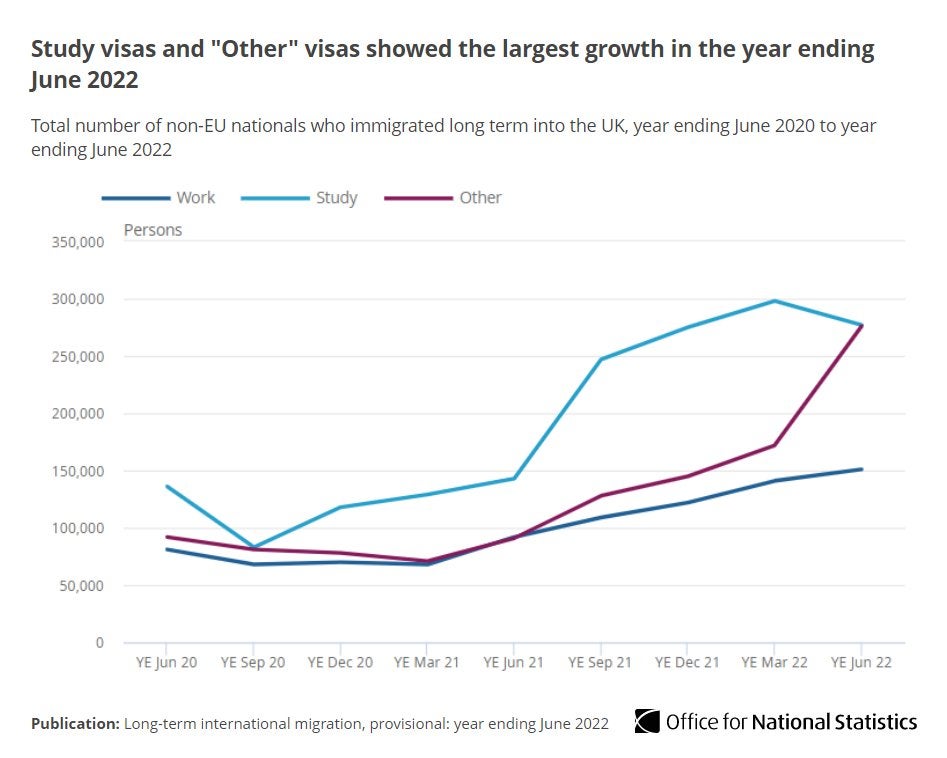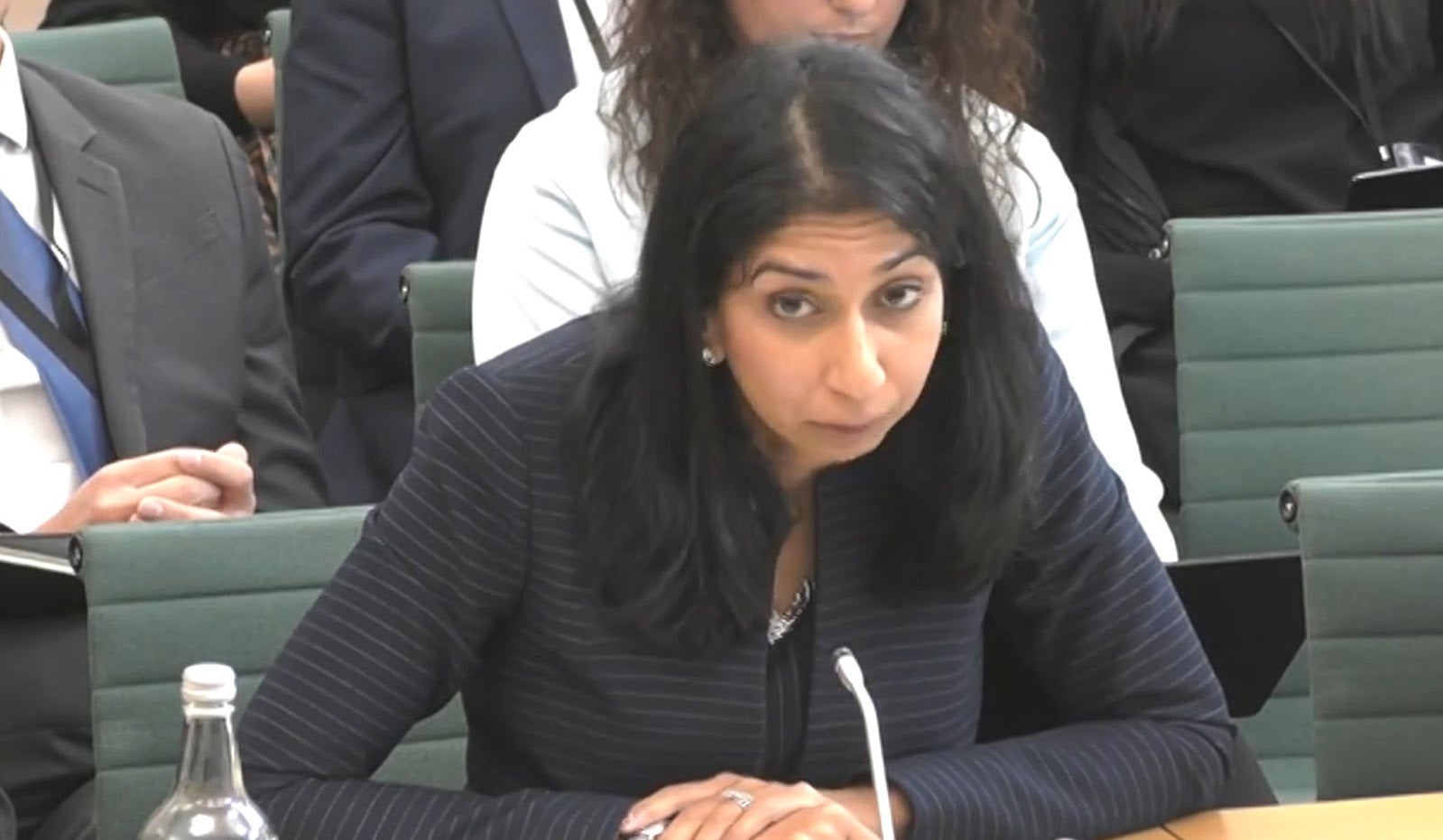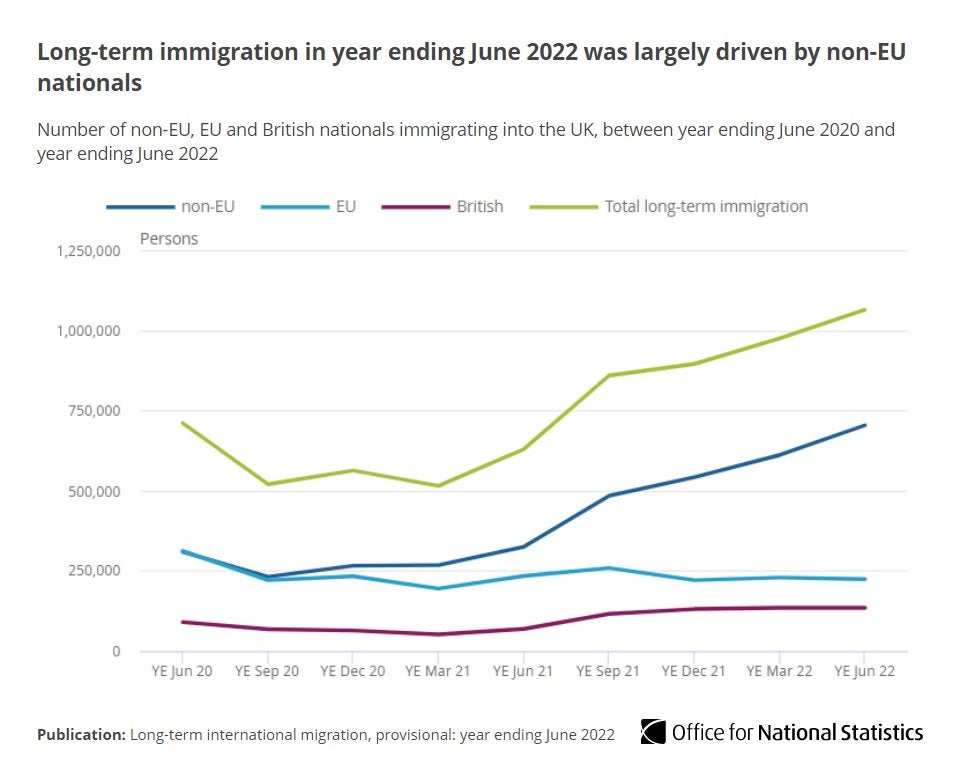Net migration to the UK reaches record high of half a million, ONS estimates show
More EU nationals have left the UK than arrived in the past year, the first negative figure since 1991
Your support helps us to tell the story
From reproductive rights to climate change to Big Tech, The Independent is on the ground when the story is developing. Whether it's investigating the financials of Elon Musk's pro-Trump PAC or producing our latest documentary, 'The A Word', which shines a light on the American women fighting for reproductive rights, we know how important it is to parse out the facts from the messaging.
At such a critical moment in US history, we need reporters on the ground. Your donation allows us to keep sending journalists to speak to both sides of the story.
The Independent is trusted by Americans across the entire political spectrum. And unlike many other quality news outlets, we choose not to lock Americans out of our reporting and analysis with paywalls. We believe quality journalism should be available to everyone, paid for by those who can afford it.
Your support makes all the difference.Net migration to the UK has reached a record high, with 504,000 more people arriving into the UK than departing in the past year, new ONS estimates show.
It is also the first time since 1991 that more EU nationals have left the UK than arrived. Net migration of EU nationals is minus 51,000 for the year up to June 2022, new estimates show.
Total immigration to the UK is at its highest level since ONS started recording the statistics in 1964 - with 1.1million people arriving in the past year.
Net migration is also at its highest level since records began. The last time net migration to the UK was close to these figures was during the fall-out from the Syrian war in March 2015, when the number was 331,000.
The increase is driven by a rise in the number of non-EU students coming to the UK, and also by hundreds of thousands of refugees from Ukraine, Afghanistan and Hong Kong. The relaxation of Covid restrictions in the UK has also contributed to the “unprecedented” increase.
In the year up to June 2022, the Office for National Statistics estimated that net migration of non-EU nationals to the UK was 509,000.
Commenting on the statistics, Jay Lindop, ONS’ deputy director of the Centre for International Migration, said that a number of world events had driven up migration to the UK in the past year.
She said that international migration patterns in the 12 months to June 2022 were “unprecedented”.
“These include the end of lockdown restrictions in the UK, the first full period following transition from the EU, the war in Ukraine, the resettlement of Afghans and the new visa route for Hong Kong British Nationals (Overseas), which have all contributed to the record levels of long-term immigration we have seen,” she added.
Migration from non-EU countries, specifically students, was driving the rise, Ms Lindop said. The easing of Covid lockdown restrictions has also contributed to this, as students no longer have to work remotely.
In the year ending June 2022, those arriving on study visas accounted for the largest proportion of long-term immigration for non-EU nationals - at 39 percent.

An estimated 277,000 of these students arrived in the UK over the past year, an increase from 143,000 in the year before.
The numbers also revealed a growing backlog in dealing with asylum claims.
The number of cases awaiting initial decision stand at 117,400, more than twice as many as two years ago, Home Office figures show.
There are now around 80,000 cases which have been awaiting an initial decision for more than six months.

Marley Morris, from the Institute for Public Policy Research think tank, said that the figures told two different stories.
“On the one hand, higher net migration is driven in large part by rising student numbers and the new Ukraine humanitarian routes - reflecting the generosity of the British public in opening their homes,” he said.
“On the other hand, the figures also show an asylum system in serious peril, with the backlog of claims growing further.”
Maria Stephens, head of campaigns at charity Refugee Action, said that the “snowballing delays in processing asylum claims are destroying lives.”
Enver Solomon, CEO of the Refugee Council, said the statistics underlined “the government’s neglect and mismanagement of the asylum system”.
Amnesty International called for a “complete overhaul” of the asylum and immigration system, saying that the government should provide safe routes for people seeking to come to Britain.
The organisation’s refugee and migrant rights director, Steve Valdez-Symonds, said: “These figures show the UK’s system for processing asylum claims remains in complete disarray.”
Over three-quarters, 77 per cent, of asylum applications were granted at the initial decision in the year ending September 2022 - the highest rate in over 30 years.
Home secretary Suella Braverman said in October that she aspired to reduce net migration to the “tens of thousands”.

Speaking at a Tory party conference fringe meeting, Ms Braverman said: “In the 90s it was in the tens of thousands under Mrs Thatcher - net migration - and David Cameron famously said tens of thousands, no ifs no buts.
“So that would be my ultimate aspiration but we’ve got to take it slowly and we’ve got to go incrementally.
“I think we have got to definitely substantially reduce the number of students, the number of work visas and in particular the number of dependants on those sorts of visas,” she said.
Reacting to the ONS figures on Thursday, Ms Braverman said the record number of people arriving in the UK was “thanks to the generosity of the British people”.
“We have welcomed hundreds of thousands of people to Britain this year following the devastating war in Ukraine, the evacuation from Afghanistan and the despicable crack down on democratic rights in Hong Kong,” she said.
Ms Braverman continued: “The public rightly expect us to control our borders and we remain committed to reducing migration over time in line with our manifesto commitment... My priority remains tackling the rise in dangerous and illegal crossings and stopping the abuse of our system.”




Join our commenting forum
Join thought-provoking conversations, follow other Independent readers and see their replies
Comments